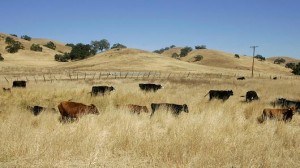The farming industry on the west coast is taking a serious toll with the lack of rainfall in California. As the drought continues, agricultural requirements are becoming more and more difficult to meet, and California farmers are suffering immensely.
It’s no secret Californians are very proactive about organic, free- range farming methods, but it is becoming increasingly difficult to meet FDA standards for the “organic” label. As of last month, the U.S. Department of Agriculture has begun to allow organic livestock farmers in the state of California to temporarily discard feeding standards that grant them the “organic” label. The drought has caused a significant lack of grass across the coast, which takes away the main source of organic feed for livestock. The animals are to graze for at least four months a year to be labeled as organic, but the sparse amount of grass has left farmers at a disadvantage during grazing months — which is why the USDA is officially cutting organic requirements in half.

The USDA is no longer enforcing neither a fixed amount of grazing time nor pasture intake for the livestock during the drought. The severity of the drought is monumental, and it has affected the majority of farms in the state. The new regulations are applied to 53 out of the 58 counties because they have been declared natural disaster areas due to their high lack of organic feed. The California Certified Organic Farmers (CCOF) and Marin Organic Certified Agriculture were the first to request a variance in the requirements to label their products as organic. Although this puts farmers at ease and allows them to remain on their feet through the drought, it also forces the industry to lower standards at a significant level.
Many directors of local environmental organizations have been distraught over the variance and finally concluded that they’ll “support this variance if that’s the only alternative,” according to OCA’s Ronnie Cummuns. Although the USDA stresses that the alteration is temporary, it also stated that it is not averse to taking further action if the drought continues at its devastating rate.
A major concern for the public is that the standards for the farming industry to deem their products as organic is already so lenient, and the drought is only allowing for more wiggle room. Organic meat and produce are already overpriced and have a very narrow consumer market, so those few who actually choose to pay the extra dollar in efforts to make a healthier choice get the short end of the stick in this scenario. Grass-fed livestock, namely cows, produce milk and meat that carry higher levels of Omega-3 and Omega-6, but with the change in feed, there comes a change in health benefits. Farmers are forced to feed their animals grain they shouldn’t be eating due to a lack of a better alternative. The poor feed results in negative effects to the animals and by in large the environment and consumers, as well.






